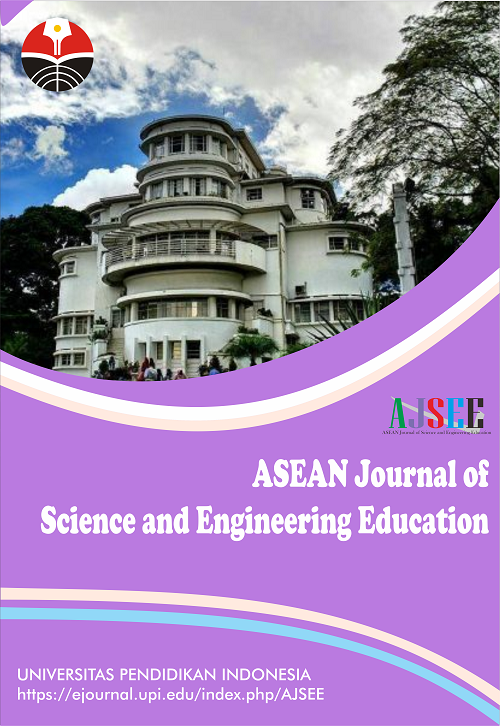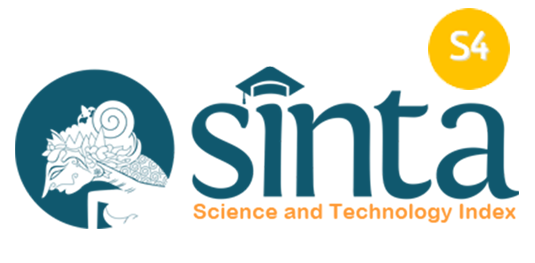Depression from and Fear of Covid-19 as predictors of Pre-service Teachers’ Mathematics Anxiety
Abstract
Keywords
Full Text:
PDFReferences
Ahorsu, D. K., Lin, C. Y., Imani, V., Saffari, M., Griffiths, M. D., and Pakpour, A. H. (2020). The fear of COVID-19 scale: Development and initial validation. International Journal of Mental Health and Addiction, 20, 1537–1545.
Alyami, M., Henning, M., Krägeloh, C. U., and Alyami, H. (2021). Psychometric evaluation of the Arabic version of the fear of COVID-19 Scale. International Journal of Mental Health and Addiction, 19(6), 2219-2232.
Awofala, A. O. A. (2017). Effect of personalisation of instruction on students’ anxiety in mathematical word problems in Nigeria. Bulgarian Journal of Science and Education Policy, 11(1), 83-120.
Awofala, A. O. A. (2019). Correlates of senior secondary school students’ mathematics achievement. Educatia 21 Journal, 17, 15-25.
Awofala, A. O. A., Akinoso, S. O., Adeniyi, C. O., Jega, S. H., Fatade, A. O., and Arigbabu, A. A. (2024). Primary teachers’ mathematics anxiety and mathematics teaching anxiety as predictors of students’ performance in mathematics. ASEAN Journal of Science and Engineering Education, 4(1), 9-24.
Awofala, A. O. A., and Akinoso, S. O. (2017). Assessment of psychometric properties of mathematics anxiety questionnaire by preservice teachers in south-west, Nigeria. ABACUS: The Journal of the Mathematical Association of Nigeria, 42(1), 355-369.
Awofala, A. O. A., and Awolola, S. A. (2011). The effect of self-efficacy, anxiety, attitude, and previous mathematics achievement on senior secondary students’ performance mathematics. African Journal of Historical Sciences in Education, 7(2), 198-209.
Awofala, A. O. A., and Falolu, O. S. (2017). Motivation to learn mathematics as correlates of pre-service teachers’ performance in mathematics. ABACUS: The Journal of the Mathematical Association of Nigeria, 42(1), 370-390.
Awofala, A. O. A., and Odogwu, H. N. (2017). Assessing preservice teachers’ mathematics cognitive failures as related to mathematics anxiety and performance in undergraduate calculus. Acta Didactica Napocensia, 10(2), 81 – 97.
Awofala, A. O. A., Malasari, P. N., Adeniyi, C. O., Lawani, A. O. and Udeani, U. N. (2022). Deploying virtual technology in mathematics instruction during covid-19 pandemic: Voices from Nigerian mathematics teachers. Nigerian Online Journal of Educational Sciences and Technology, 4(2), 1-12.
Awofala, A. O. A., Oladipo, A., and Lawal, F. R. (2021a). Teachers’ perception of the influence of COVID-19 on the performance of senior secondary school class three students: Inferences for STEM education in Nigeria. Nigerian Online Journal of Educational Sciences and Technology, 3(2), 23-30.
Awofala, A. O. A., Olafare, O. F., Awofala, A. A., Ojo, O. T., Fatade, A. O., Arigbabu, A. A., and Udeani, U. N. (2021b). Prevalence of COVID-19 in Nigeria: Doorway for digital learning of mathematics amid senior secondary science and mathematics students. International Journal of Innovative Technology Integration in Education, 5(1), 9-16.
Awofala, A. O., and Lawal, R. F. (2022). The relationship between critical thinking skills and quantitative reasoning among junior secondary school students in Nigeria. Jurnal Pendidikan Matematika (Kudus), 5(1), 1-16.
Awofala, A.O.A. (2016). Effect of personalisation of instruction on students’ motivation to learn mathematics word problems in Nigeria. Turkish Journal of Computer and Mathematics Education, 7(3), 486-509.
Awofala, A.O.A., Lawani, A.O., and Adeyemi, O.A. (2020). Motivation to learning mathematics and gender as correlates of senior secondary school students’ performance in mathematics. Journal of Educational Sciences, 4(2), 318-333.
Banerjee, D. (2020). The other side of COVID-19: Impact on obsessive compulsive disorder (OCD) and hoarding. Psychiatry research, 288, 112966.
Bitan, D. T., Grossman-Giron, A., Bloch, Y., Mayer, Y., Shiffman, N., and Mendlovic, S. (2020). Fear of COVID-19 scale: Psychometric characteristics, reliability and validity in the Israeli population. Psychiatry Research, 289, 113100.
Brown, T. A., Chorpita, B. F., Korotitsch, W., and Barlow, D. H. (1997). Psychometric properties of the depression anxiety stress scales (DASS) in clinical samples. Behaviour Research and Therapy, 35(1), 79-89.
Carleton, R. N. (2016). Fear of the unknown: One fear to rule them all?. Journal of Anxiety Disorders, 41, 5-21.
Casale, S., and Flett, G. L. (2020). Interpersonally-based fears during the COVID-19 pandemic: Reflections on the fear of missing out and the fear of not mattering constructs. Clinical Neuropsychiatry, 17(2), 88.
Chahrour, M., Assi, S., Bejjani, M., Nasrallah, A. A., Salhab, H., Fares, M., and Khachfe, H. H. (2020). A bibliometric analysis of COVID-19 research activity: A call for increased output. Cureus, 12(3), 1-8.
Coelho, C. M., Suttiwan, P., Arato, N., and Zsido, A. N. (2020). On the nature of fear and anxiety triggered by COVID-19. Frontiers in Psychology, 11, 581314.
Fergus, T. A. (2013). A comparison of three self-report measures of intolerance of uncertainty: An examination of structure and incremental explanatory power in a community sample. Psychological Assessment, 25(4), 1322.
Hopko, D. R., Mahadevan, R., Bare, R. L., and Hunt, M. K. (2003). The abbreviated math anxiety scale (AMAS) construction, validity, and reliability. Assessment, 10(2), 178-182.
Jamerson, K., Josh, M., and Joshua, B. (2020). Student-loan debt relief offers support to an economy battered by coronavirus. Wall Street Journal, 12(3), 99-96.
Khachfe, H. H., Chahrour, M., Sammouri, J., Salhab, H., Makki, B. E., and Fares, M. (2020). An epidemiological study on COVID-19: A rapidly spreading disease. Cureus, 12(3), e7313.
Kim-Cohen, J., Caspi, A., Moffitt, T. E., Harrington, H., Milne, B. J., and Poulton, R. (2003). Prior juvenile diagnoses in adults with mental disorder: Developmental follow-back of a prospective-longitudinal cohort. Archives of general psychiatry, 60(7), 709-717.
Lawal, R. F., and Awofala, A. A. (2021). Effect of team assisted Individualisation strategy on senior secondary school students’ motivation to learn Mathematics. Nigerian Online Journal of Educational Sciences and Technology, 3(1), 36-46.
Lovibond, P. F., and Lovibond, S. H. (1995). The structure of negative emotional states: Comparison of the depression anxiety stress scales (DASS) with the Beck Depression and Anxiety Inventories. Behaviour Research and Therapy, 33(3), 335–343
Mertens, G., Gerritsen, L., Duijndam, S., Salemink, E., and Engelhard, I. M. (2020). Fear of the coronavirus (COVID-19): Predictors in an online study conducted in March 2020. Journal of Anxiety Disorders, 74, 102258.
Novella, E. J. (2022). COVID-19 and the emotional culture of pandemics: A retrospective and prospective view. Paedagogica Historica, 58(5), 660-675.
Okunuga, R. O., Awofala, A. O. A., and Osarenren, U. (2020). Critical thinking acquisition of senior secondary school science students in Lagos state, Nigeria: A predictor of academic achievement. Journal of Curriculum and Instruction, 13(1), 44-56.
Sahu, P. (2020). Closure of universities due to coronavirus disease 2019 (COVID-19): Impact on education and mental health of students and academic staff. Cureus, 12(4), 1-8.
Schimmenti, A., Billieux, J., and Starcevic, V. (2020). The four horsemen of fear: An integrated model of understanding fear experiences during the COVID-19 pandemic. Clinical neuropsychiatry, 17(2), 41-45.
Sopekan, O. S. and Awofala, A. O. A. (2019). Mathematics anxiety and mathematics beliefs as correlates of early childhood pre-service teachers’ numeracy skills. Pedacta, 9(2), 13-24.
Spina, S., Marrazzo, F., Migliari, M., Stucchi, R., Sforza, A., and Fumagalli, R. (2020). The response of Milan's Emergency Medical System to the COVID-19 outbreak in Italy. Lancet (London, England), 395(10227), e49.
DOI: https://doi.org/10.17509/ajsee.v5i1.74633
Refbacks
- There are currently no refbacks.
Copyright (c) 2024 Universitas Pendidikan Indonesia

This work is licensed under a Creative Commons Attribution-ShareAlike 4.0 International License.














